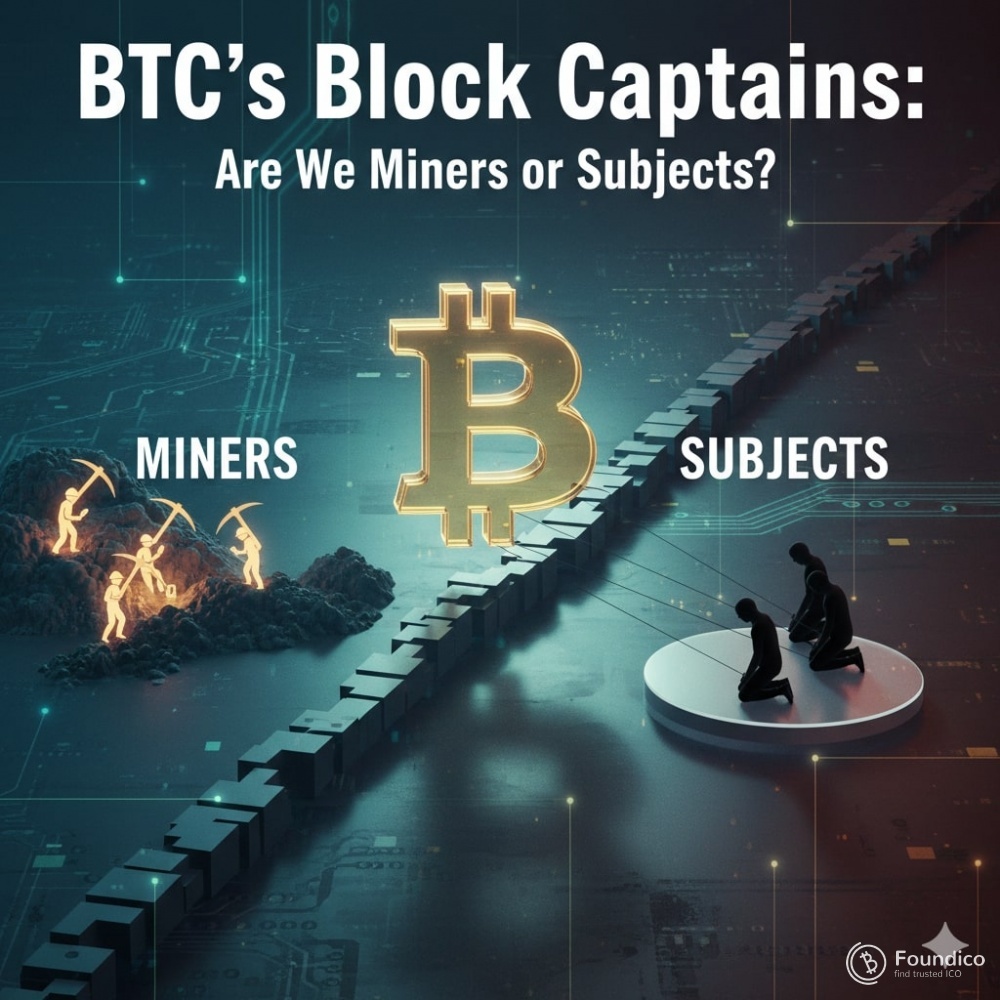BTC’s Block Captains: Are We Miners or Subjects?

By Dr. Pooyan Ghamari, Swiss Economist and Visionary
The allure of Bitcoin lies in its promise of decentralization—a system where no single government, bank, or corporation holds the power to inflate, censor, or control. At the heart of this system are the miners, who secure the network by validating transactions and forging new blocks. They are the "Block Captains" of the digital domain, entrusted with maintaining the immutable ledger.
But as Bitcoin has matured from a niche technology into a global industry, a critical question arises for its users and investors: are we, the users, truly sovereign citizens of this decentralized realm, or are we becoming mere subjects to an increasingly powerful, centralized mining oligarchy?
The Miner’s Dual Role: Securing vs. Governing
The miner's job is twofold:
-
Security and Creation: Miners expend massive computational power (Proof-of-Work) to solve a complex cryptographic puzzle, which is the mechanism that secures the entire network against attack and introduces new Bitcoin into circulation. This costly effort is what makes the blockchain immutable and trustless.
-
Transaction Selection: Once a miner wins the right to propose a new block, they act as the gatekeeper, selecting which pending transactions from the mempool to include. They are incentivized to prioritize transactions with higher fees, effectively setting the price of settlement on the network.
This transactional gatekeeping is where the subtle shift in power emerges. Miners certainly cannot change the fundamental rules of Bitcoin—those are enforced by all full nodes across the network (including users' nodes) who reject any blocks that violate the consensus rules. The rest of the network serves as the ultimate judiciary.
However, miners do possess significant, localized power in the short term: censorship and fee control.
The Centralization Conundrum
The economic realities of Bitcoin mining have driven the industry toward massive-scale operations, highly specialized hardware (ASICs), and mining pools. When a few large pools command a majority of the network's hash rate, the possibility of a coordinated action—or even a regulatory vulnerability—increases.
-
The Censorship Risk: A major mining pool, pressured by a national government or a global regulatory body, could theoretically choose to censor specific transactions (e.g., those associated with sanctioned entities). While another miner would likely pick up the transaction eventually, this localized censorship still undermines the network's promise of absolute permissionlessness.
-
The Fee Subjectivity: As block rewards diminish (due to the Halving), miners become increasingly reliant on transaction fees for revenue. This creates an economic incentive to maintain a competitive environment for block space, turning the act of having a transaction confirmed into a bidirectional competition: users bid against each other for space, and miners compete for the right to collect the resulting fees. The user is a subject to these market-driven fees, a necessary cost for securing their transaction's place in history.
The Balance of Power: Nodes are the Law
The true genius of the Bitcoin design is the distributed nature of its governance, a system that prevents the "Block Captains" from becoming absolute "Kings."
The power structure of Bitcoin is a triad:
-
Developers: They propose changes and write the code (e.g., Bitcoin Improvement Proposals or BIPs).
-
Miners: They secure the network and signal support for software upgrades.
-
Full Node Operators (The Users): They download and run the software, effectively enforcing the consensus rules.
Crucially, a block is only valid if the full nodes accept it. If a cartel of miners were to produce a block that violated the core rules (e.g., creating too many coins), the network of node operators—the silent majority—would simply reject the block. The miners would have wasted enormous energy and would have to start over on the valid, uncorrupted chain.
Active Citizenship is the Defense
The question, "Are We Miners or Subjects?", forces a deeper appreciation of the network's dynamics. We are not all miners, but we are all responsible citizens of the network.
While the increasing centralization of mining power presents a continual threat to decentralization, the system remains anti-fragile because the power to validate (the full node) is distinct from the power to mine (the Block Captain). As the Bitcoin ecosystem matures, the ultimate defense against becoming subjects is the proliferation of independent full nodes run by users.
The price of freedom in a decentralized system is eternal vigilance, manifest through running code and validating the ledger. By enforcing the rules, we ensure that the Block Captains remain hired security guards for the network, not its ultimate rulers.

 Pepenode - Pepenode is a utility meme coin token designed to power the Pepenode ecosystem, a gamified virtual mining platform for meme coins
Pepenode - Pepenode is a utility meme coin token designed to power the Pepenode ecosystem, a gamified virtual mining platform for meme coins